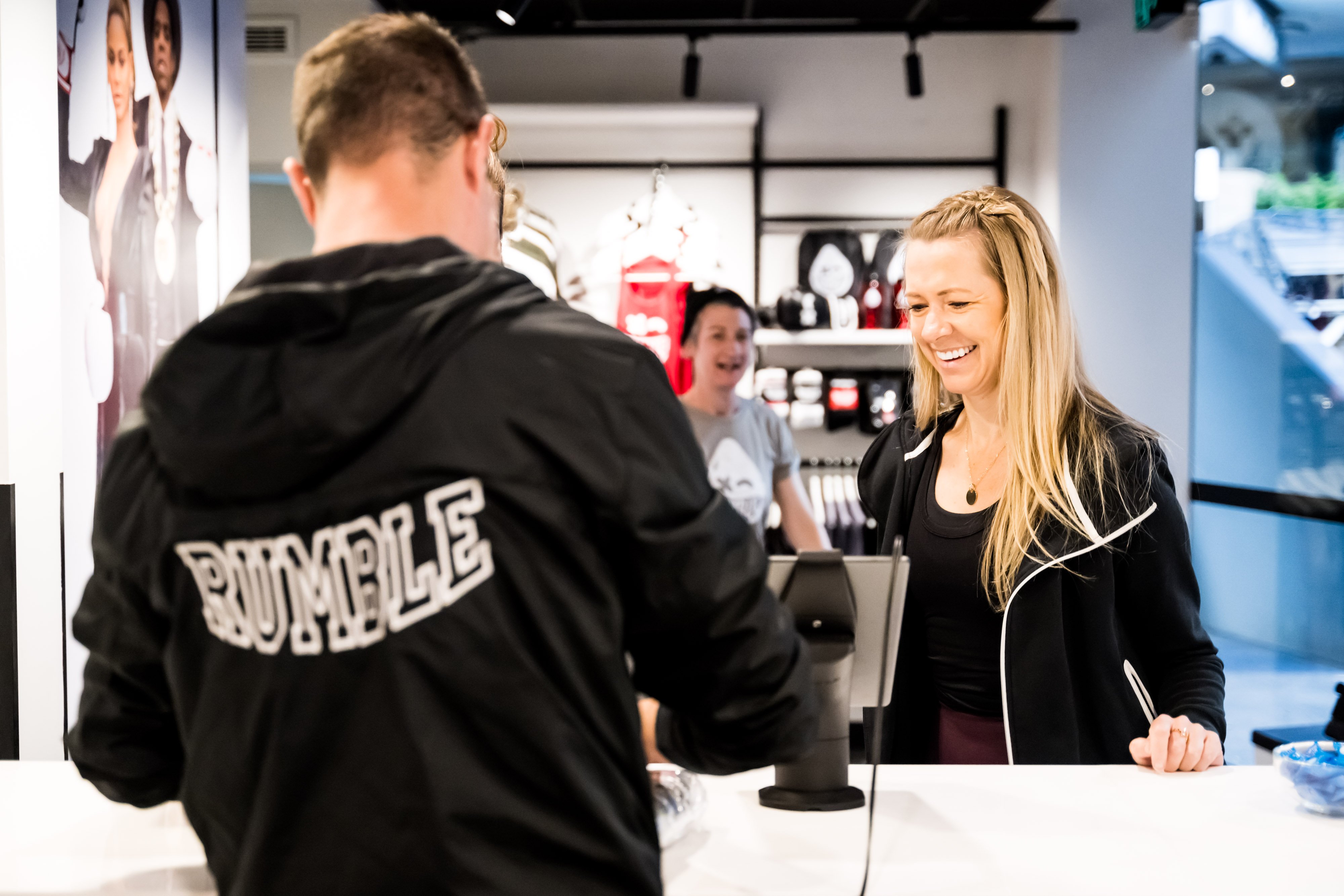Whether you’ve just completed an intense workout, like a boxing class at Rumble or simply getting your daily steps in, nutrition plays an essential role in your fitness journey. While we often focus on the physical aspects of a workout routine, what you eat after your workout is equally crucial for achieving your fitness goals.
Post-workout nutrition not only aids in muscle recovery and growth but also replenishes energy stores, enhances performance, and supports overall well-being.
In this post, we explore everything you need to know about post-workout nutrition, exploring the optimal foods and strategies to fuel your body for success!
The Importance Of Post Workout Nutrition
After a workout, your body is in the best state to utilise nutrients and replenish energy stores. That’s why eating the right foods after your workout is essential:
- Supports Muscle Recovery and Growth When you push your body during a workout, you create micro-tears in your muscle fibres. It's during the post-workout period that your muscles begin to repair and rebuild. Post-workout nutrition provides essential amino acids from protein sources, the building blocks for muscle repair and growth.
- Replenishing Glycogen Stores: Exercise depletes glycogen stores, which is the primary fuel source for muscles. Replenishing these stores after exercise ensures your body has the energy it needs for recovery and future workouts.
- Hydration: Replacing lost fluids through proper hydration is essential for optimal recovery. Dehydration can impair muscle function and hinder recovery, so staying hydrated is crucial for overall performance and well-being.
When Should You Eat After A Workout?
After an intense workout, it's important to refuel your body with the right macronutrients to aid in post-workout recovery. The key macronutrients to focus on include carbohydrates and protein.
Carbohydrates play a vital role in replenishing glycogen stores, which are the primary fuel source for muscles. Opt for complex carbohydrates like brown rice, whole-grain bread, or rice cakes to provide a steady release of energy. Aim for around 20-30 grams of carbohydrates to kickstart the replenishment process.
Protein is essential for muscle repair and growth. Including lean sources of protein in your post-workout meal is crucial. Good options include chicken, fish, eggs, Greek yogurt, or protein shakes. Aim for 20-30 grams of protein within an hour after your workout to enhance muscle recovery and repair.
In addition to carbohydrates and protein, staying hydrated is equally important.
Remember, the right macronutrients in your post-workout meal will help facilitate muscle recovery, replenish energy stores, and optimise your performance in subsequent workouts.

Tips On The Best Foods To Eat After A Workout
When it comes to post-workout nutrition, it's essential to maintain a focus on healthy eating. Just like any other meal, it's recommended to aim for a balanced combination of complex carbohydrates, protein, and healthy fats. These nutrients are vital for refuelling your body and aiding in post-workout recovery.
Carbohydrates
After a workout, carbohydrates play a crucial role in replenishing depleted glycogen, ensuring you're ready for your next intense session. Opt for minimally processed, complex carbohydrates, as they are digested slower and reduce spikes in blood sugar levels. Additionally, they contain more vitamins, minerals, and fibre compared to refined carbohydrates and added sugars.
Good sources of carbohydrates include:
- Oatmeal
- Brown rice
- Whole-grain bread
- Rice cakes
- Sweet potatoes
Protein
Protein is essential for supplying your body with amino acids, which support muscle repair and growth. Try to consume high-quality protein sources post-workout, such as:
- Eggs
- Greek yogurt
- Nuts, nut butter
- Fish and lean meat
While it's crucial to prioritise protein intake after exercise, it's equally important to ensure you're meeting your overall daily protein requirements to support overall health and muscle recovery.
Healthy Fats
While fats may not be as emphasized as carbohydrates and protein in post-workout nutrition, they still play a role in supporting recovery and overall well-being. Healthy fats help you feel full, stabilise energy levels, and aid in the absorption of fat-soluble vitamins.
Omega-3 fats, found in foods like salmon, chia seeds, and flax seeds, can also help reduce inflammation. However, it is important to consider that you may not need to add a separate source of fat to your post-workout meal or snack, as some protein-rich foods naturally contain fats.
Consider incorporating sources such as eggs, avocado, nuts, nut butter, and extra virgin olive oil into your post-workout meals for added nutritional benefits.
Hydration, Hydration, Hydration
During exercise, your body loses fluids through sweat to regulate body temperature and maintain optimal performance. However, hydration can often be overlooked, especially when it comes to post-workout nutrition even though it is just as important as refuelling with food!
- Supports Muscle Recovery: Hydration is vital for helping muscle recovery after exercise. Dehydration can impair muscle repair and growth, prolonging the recovery process and potentially hindering performance in future workouts.
- Maintains Electrolyte Balance: Sweating not only results in fluid loss but also depletes essential electrolytes such as sodium, potassium, and magnesium. These electrolytes play crucial roles in muscle contraction, nerve function, and fluid balance within the body. Replenishing electrolytes through proper hydration prevents imbalances that can lead to cramping, fatigue, and decreased performance.
While water is always one of the best ways to stay hydrated, longer workouts may benefit from sports drinks that are specially formulated to maintain electrolyte balance energy.

Looking At Important Vitamins & Minerals
After a workout, it's not only carbohydrates and protein that are crucial for optimal recovery and muscle repair. Including important vitamins and minerals in your post-workout meal can further support your body's needs. Here’s a closer look:
- Vitamin C: This antioxidant vitamin plays a role in collagen synthesis, which is important for the health of your muscles, tendons, and ligaments. It also helps to boost your immune system. Get your vitamin C fix from fruits like oranges, strawberries, or kiwi.
- Vitamin E: Vitamin E helps to reduce exercise-induced oxidative stress and inflammation. Foods rich in vitamin E include almonds, sunflower seeds, spinach, and avocados.
- Magnesium: This mineral is involved in over 300 biochemical reactions in the body, including muscle contractions and energy production. Good sources of magnesium include nuts, seeds, spinach, and whole grains.
- Zinc: Zinc is important for protein synthesis, immune function, and tissue repair. Sources of zinc include lean meats, seafood, nuts, and seeds.
- Potassium: Potassium helps to maintain fluid balance, nerve function, and muscle contractions. Bananas, sweet potatoes, yoghurt, and spinach are good sources of potassium.
What Not To Eat & Things To Avoid
While post-workout nutrition is essential for recovery and replenishment, there are certain foods and beverages that are best avoided. These items can hinder your progress and impede the benefits of your workout, ultimately sabotaging your fitness goals.
Steer clear of sugary treats like cookies, candies, and cakes, as well as foods with high-fat contents. These indulgences may be tempting, but they won't help your muscles recover effectively and can potentially cause an upset stomach.
Additionally, foods that have “empty calories” like simple carbs or processed foods lack the essential nutrients and provide little to no benefit in terms of recovery and performance.
When it comes to beverages, avoid anything with high added sugars, as they can be inflammatory and detrimental to your body's recovery process. Sugary drinks offer little nutritional value and can spike blood sugar levels, leading to energy crashes and potential disruptions in your recovery.

Post Work-Out Meals & Snacks
Now that you know what you can eat and what you should avoid, what meals should you consider? let's explore some delicious and nutritious post-workout meal and snack options to fuel your body effectively and support optimal recovery.
Post-Workout Meals
- Protein-packed smoothie: Blend a scoop of protein powder, a cup of low-fat milk or almond milk, a banana, and a handful of spinach. This combination provides a dose of protein, carbohydrates, and essential vitamins and minerals.
- Grilled chicken salad: Toss some grilled chicken breast with mixed greens, cherry tomatoes, cucumbers, and a drizzle of olive oil and balsamic vinegar. This meal is rich in lean protein, vitamins, and minerals.
- Veggie omelette: Whip up an omelette with egg whites, spinach, bell peppers, mushrooms, and onions. This meal is low in calories, high in protein, and packed with essential vitamins and minerals.
- Quinoa stir-fry: Cook quinoa and sauté it with mixed vegetables such as broccoli, carrots, and peas. Add in some tofu or lean meat for added protein. This meal provides a good balance of carbohydrates, protein, and fibre.
Post-Workout Snacks
- Greek yogurt with berries and a sprinkle of granola
- Whole-grain toast with almond butter and banana slices
- Cottage cheese with pineapple chunks and a handful of almonds
- Hummus with carrot and cucumber sticks
- Hard-boiled eggs
- Protein or granola bars
%20(2).jpg?width=1000&height=667&name=DSC_1067%20(1)%20(2).jpg)
Fuelling Your Body For Success
Remember, your fitness journey doesn't end when your workout does—proper post-workout nutrition is the key to unlocking your full potential and maximizing your results. Not only does it replenish your energy, but it also supports muscle growth and repair.
If you’re starting your fitness journey, or looking for a fun and challenging way to switch up your existing routine, join Rumble Boxing today! Led by expert trainers, you'll challenge your body, improve your fitness, and unleash your inner champion. Take the next step towards a healthier, stronger you—book your boxing class today and start achieving your fitness goals with us!


.jpg?width=600&name=ASH_BOXING_2%20(3).jpg)
%20(1).jpg?width=600&name=DSC_1610%20(2)%20(1).jpg)